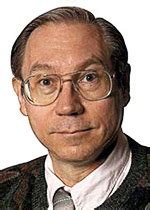A Quote by Irina Bokova
Literacy is much more than an educational priority - it is the ultimate investment in the future and the first step towards all the new forms of literacy required in the twenty-first century. We wish to see a century where every child is able to read and to use this skill to gain autonomy.
Related Quotes
I would teach how science works as much as I would teach what science knows. I would assert (given that essentially, everyone will learn to read) that science literacy is the most important kind of literacy they can take into the 21st century. I would undervalue grades based on knowing things and find ways to reward curiosity. In the end, it's the people who are curious who change the world.
By 1940 the literacy figure for all states stood at 96 percent for whites. Eighty percent for blacks. Notice for all the disadvantages blacks labored under, four of five were still literate. Six decades later, at the end of the 20th century, the National Adult Literacy Survey and the National Assessment of Educational Progress say 40 percent of blacks and 17 percent of whites can't read at all. Put another way, black illiteracy doubled, white illiteracy quadrupled, despite the fact that we spend three or four times as much real money on schooling as we did 60 years ago.
If you are serious about your religion, if you really wish to commit yourself to the spiritual quest, you must learn how to use psychochemicals. Drugs are the religion of the twenty-first
century. Pursuing the religious life today without using psychedelic drugs is like studying astronomy with the naked eye because that's how they did it in the first century A.D., and besides
telescopes are unnatural.
In Western Pennsylvania, our parents and grandparents left us a strong system of roads, rails, bridges, locks, dams, streetcars, and more - an investment that paid off throughout the twentieth century. It now falls to our generation to rebuild and improve upon this system for the twenty-first century.

































